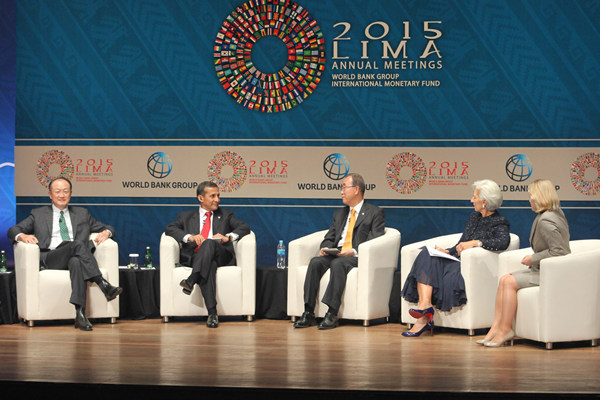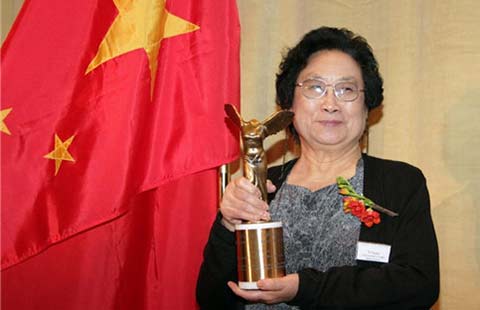IMF welcomes a global yuan
Updated: 2015-10-12 03:40
By MAO PENGFEI and CHU YI(China Daily Latin America)
|
||||||||
 |
|
From left: Jim Yong Kim, president of the World Bank; Ollanta Humala, president of Peru; Ban Ki-moon, United Nations secretary-general; Christine Lagarde, International Monetary Fund (IMF) managing director; and Justine Greening, British International Development Secretary attend the seminar Towards the Year 2030 at the annual meeting of the World Bank Group and the IMF, in Lima, Peru on Oct 9. [Photo/Agencies] |
International Monetary Fund (IMF) officials in Lima expressed support for the Chinese currency's internationalization and confidence in China’s economy, pointing out structural transformation and labor productivity growth as keys to its economic growth, during the World Bank Group and IMF annual meeting.
The IMF will complete an assessment of the Chinese yuan's status as a new currency for Special Drawing Rights (SDRs), said the organization’s Managing Director Christine Lagarde on Oct 9.
"Before the end of 2015, the IMF will complete a technical assessment (on the yuan, or renminbi (RMB)). This is nearly completed and recommendations are being finalized. … The review will determine implementation from September 2016 to allow time for central banks to adjust, including their computers," said Lagarde.
In November, the IMF will decide whether to extend the current valuation of the SDR or whether to add the RMB to this basket for five years (2016-2021).
"Whether the RMB can be included in the SDR basket is an important implication concerning the status of the RMB in the global community, which will promote the wide use of the RMB in international trade, adding the RMB to foreign reserves and strengthening China's finance and economy," said Zhu Min, deputy managing director of the IMF.
The SDR, an international reserve asset created by the IMF in 1969 to supplement the existing official reserves of member countries, is a basket of key international currencies, including the euro, Japanese yen, British pound sterling, and US dollar.
"If the RMB makes it into the SDR basket, it will become a global currency in the real sense, marking the first time the IMF accepts the currency of an emerging economy into its currency reserves," Zhu said.
The move, he added, would greatly increase the status of RMB in the international arena, allowing the voices of emerging markets to draw more attention and would advance the reform of the IMF as a more inclusive organization.
Zhu believes the internationalization of RMB has developed rapidly in the past decade. The RMB's circulation abroad has undergone great changes, with many countries willing to accept the RMB as part of their foreign reserves. "Further down the road, the SDR will have great influence on RMB internationalization."
The RMB's ability to go global, becoming a transaction currency and a settlement currency of trade, is significant to the stable development of China's finance and economy, Zhu said.
Also in Lima, Yi Gang, deputy governor of the People's Bank of China, said that China will continue to push ahead financial reforms with the hope that its currency can be included in the SDR basket later this year.
China has opened its interbank bond market and forex market to overseas financial institutions and has been promoting data transparency, following SDR requirements. The central bank has recently further freed the RMB exchange rate through changes to the central parity rate mechanism to make the exchange rate more flexible, Yi said.
In addition to Lagarde's comments, which were perhaps the clearest sign yet that the IMF may be ready to include the RMB in the SDR, the IMF's latest forecast for economic growth shows the organization's confidence in the China's economy.
According to the organization's updated forecast, global economic growth this year will be 3.1 percent, down from the 3.3 percent IMF forecast in July and the 3.5 percent it projected in April. However, it forecast China's gross domestic product (GDP) growth will remain steady at 6.8 percent in 2015.
China faces a process of rebalancing as it steadily adjusts its economic structure, moving from an investment and export-driven economy to a service and domestic, consumer-driven model of economic development, Zhu Min said.
The service sector in China's GDP outperformed the industrial sector for the first time last year, and consumption overtook investment as the main contributor to overall GDP growth, demonstrating that the macro structure of China's economy is heading in the right direction, according to the deputy director.
The slower growth of China's economy cannot be forcibly revved up as it minimizes risk while improving quality, he added.
Zhu is confident of China's economic growth, saying the sustainable growth of labor productivity is the key to economic growth and long-term development.
"At present, the biggest pressure on China's economy comes from continuous internal rebalancing and structural adjustment, including labor market reform, industrial structure adjustment and more investment in education and innovation, the goal of which is to boost labor productivity," he said.
During the annual meetings in Lima, China's Finance Minister Lou Jiwei said on Sunday that from 10 percent in the years 2009-2011 to the current 7 percent, the growth rate of China has become slower. However, 7 percent is still a very high growth rate on the international level.
Ultrahigh speed of growth is not sustainable, as is the overreliance on government investment and real estate. Therefore, transformation on economic structure and development drives are necessary. A properly slower growth is a sound process, Lou said.

 One killed in Northern Arizona University shooting
One killed in Northern Arizona University shooting
 Students join outdoor courses in countryside
Students join outdoor courses in countryside
 Stewardesses trained to show sweet smile
Stewardesses trained to show sweet smile
 Tourist attractions receive30 million visitors during Golden Week
Tourist attractions receive30 million visitors during Golden Week
 Top 10 most competitive economies
Top 10 most competitive economies
 Cold wave sweeps through China
Cold wave sweeps through China
 Taking a peek
Taking a peek
 News you don't wanna miss over the National Day holiday
News you don't wanna miss over the National Day holiday
Most Viewed
Editor's Picks

|

|

|

|

|

|
Today's Top News
Tu first Chinese to win Nobel Prize in Medicine
Huntsman says Sino-US relationship needs common goals
Xi pledges $2 billion to help developing countries
Young people from US look forward to Xi's state visit: Survey
US to accept more refugees than planned
Li calls on State-owned firms to tap more global markets
Apple's iOS App Store suffers first major attack
Japan enacts new security laws to overturn postwar pacifism
US Weekly

|

|







